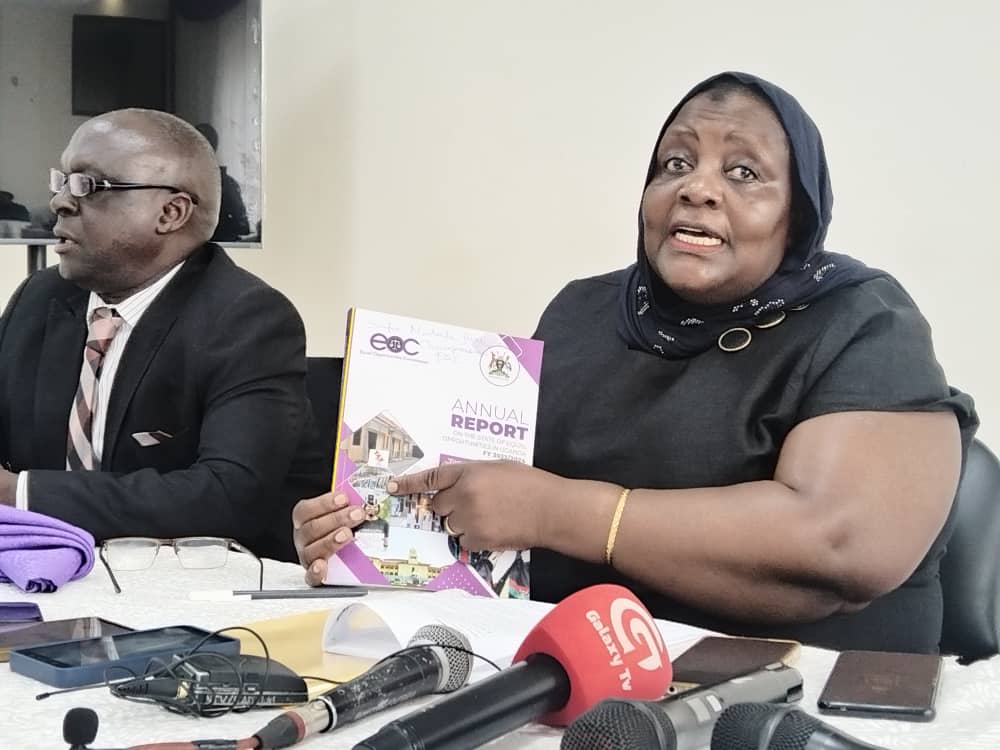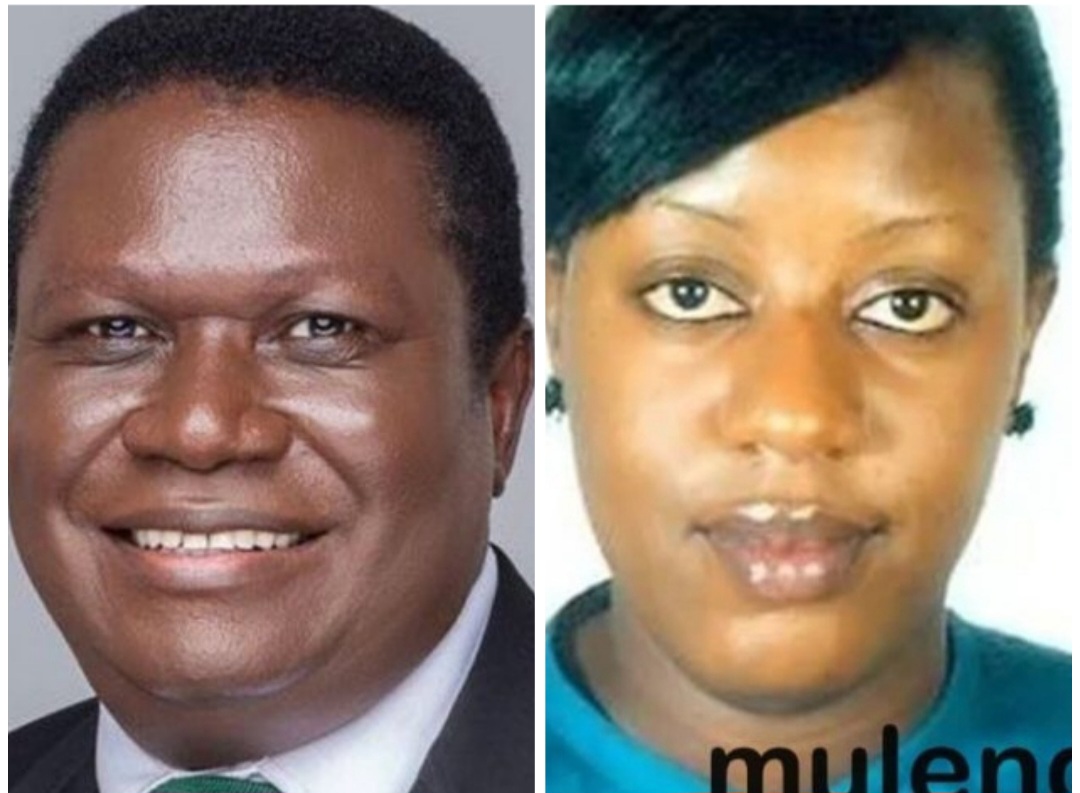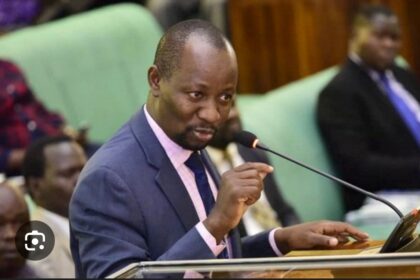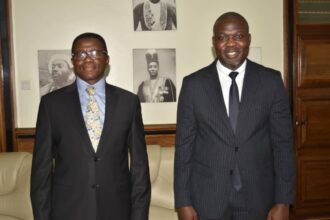The Equal Opportunities Commission (EOC), chaired by Hon. Safia Nalule Juuko, has released its comprehensive 11th Annual Report on the state of equal opportunities in Uganda for the Financial Year 2023/2024.
The report sheds light on critical disparities across public service sectors, education, budgeting, and access to justice, providing an in-depth analysis of systemic challenges and practical recommendations for reform.
The report highlighted major inefficiencies in Uganda’s fiscal planning and resource allocation. Debt repayment consumes Shs 34 trillion which is 47.9 per cent of the Shs 72 trillion national budget leaving limited funds for vital sectors like education and health. Local governments (LGs) receive only Shs 5.9 trillion, with non-wage expenditures accounting for just Shs 1.5 trillion.
“Centralized planning does not reflect the priorities of different regions, creating a mismatch between national goals and community needs,” Hon. Nalule noted during the press conference at EOC offices in Kampala on Tuesday. “For instance, while some regions prioritize water and school infrastructure, others require targeted agricultural support, which remains underfunded.”
Additionally, the return of Shs 5.8 trillion in unutilized funds to the Treasury representing an 88.2% performance rate signals inefficiencies that stifle progress.
The report also disclosed a glaring wage gap existing within public institutions, with the Commissioner General of Uganda Revenue Authority (URA) earning over Shs64 million monthly, while the Secretary of Uganda Land Commission takes home just 2.4 million. Juuko noted that this disparity not only undermines equity but also affects productivity and morale.
Key findings revealed that science teachers earn significantly more than arts teachers, despite having similar qualifications. For example, a science teacher earns Shs4.25 million monthly, compared to Shs 1.31 million for their arts counterparts. These disparities have led to workplace tensions, resignation surges, and demotivation among arts educators and school heads.
To bridge this gap, the EOC recommends transferring salary review functions to its mandate, ensuring equity across public service roles.
Universal Primary and Secondary Education (UPE and USE) schools also became an issue in the report noting that initially the duo was designed to offer free education, and are instead charging fees ranging from Shs 4,000 to Shs 364,000. Non-USE government schools are even costlier, with some institutions like Mount St. Mary’s Namagunga charging up to Shs 2.48 million per term.
The EOC found that these fees stem from insufficient government funding and delays in disbursing capitation grants. Vulnerable groups are disproportionately affected, with many children dropping out due to financial constraints.
In response, the Commission recommends legal action against headteachers charging illegal fees, partnerships with school foundation bodies to enforce fee-free education, and reallocating funds from affluent schools to underfunded institutions.
Access to justice remains a significant hurdle, particularly for vulnerable groups. The report identifies gaps such as the absence of judicial officers in 34 Magistrate Courts, corruption, and high legal fees. For example, districts like Ntoroko, Mukono, and Zombo have no operational courts, forcing citizens to travel long distances for legal recourse.
“The high cost of justice discourages vulnerable groups from seeking legal remedies,” Hon. Nalule said, emphasizing the need for urgent reform.
The EOC recommends funding rural legal aid services, recruiting more judicial officers, and operationalizing dormant Magistrate Courts to enhance accessibility.
It also highlighted significant regional disparities in scholarship distribution and energy access, with sub-regions like Buganda and Ankole benefiting more than underserved areas such as Karamoja, Lango, and West Nile. Affirmative action policies and rural electrification initiatives were recommended to bridge these gaps.
Youth challenges, including high unemployment (9.8%) and poverty (14%), require targeted job creation, entrepreneurship programs, and financial inclusion efforts.
Juuko through the report called for urgent government and stakeholder action to address systemic inefficiencies in resource allocation and service delivery, emphasizing equal opportunities as essential for Uganda’s inclusive growth.
Susan Atukunda, Senior Research Officer at the Equal Opportunities Commission, shared the comprehensive process used in their study on equal opportunities in Uganda.
She explained, “We gathered data from both primary and secondary sources, with primary data collected from surveys, interviews, and focus group discussions involving various individuals and key stakeholders, including marginalized groups.” Secondary data, she noted, came from “existing reports, government publications, and statistics from the Uganda Bureau of Statistics (UBOS), the Ministry of Energy, and other key government bodies.”
To ensure broad representation, Atukunda stated, “We used a mix of purposive, cluster, and stratified random sampling to ensure that all regions, genders, age groups, and relevant demographics were well represented.” The study focused on key indicators such as “access to education, health services, economic participation, and justice,” drawing from frameworks like the Sustainable Development Goals (SDGs).
In terms of data analysis, she mentioned, “We applied descriptive statistics for quantitative data and thematic analysis to capture people’s experiences for qualitative data.” Atukunda also emphasized the validation process: “We validated our findings through consultations with key stakeholders, including marginalized groups, government representatives, and subject-matter experts, ensuring that our data was accurate, relevant, and reflective of the real experiences and needs of the communities we aim to serve.”
Do you have a story in your community or an opinion to share with us: Email us at Submit an Article









